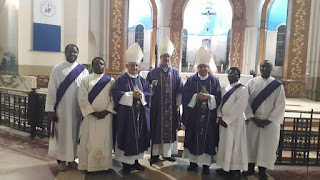JESUS PRAYS FOR YOU.
Homily for the Seventh Sunday of Easter, Year C
Fr. Ugochukwu Ugwoke, ISch
Scriptural Texts: Acts 7:55-60, Revelation 22:12-14.
16-17. 20, John 17:20-26
The
gospel reading of this seventh Sunday of Easter is a part of the famous High
Priestly Prayer of Jesus found in the gospel according to John (John 17:1-26). Jesus
offered this prayer to his Father shortly before his arrest, passion and death.
The prayer, whose main focus is on unity, can be divided into three parts. In
the first part of the prayer, Jesus prays for himself (John 17:1-5). In the
second part, Jesus prays for his disciples (John 17:6-19), and in the third
part which is our today’s gospel reading, Jesus prays for the Church- the whole
community of believers (John 17:20-26). In the whole prayer, we find elements of
sacrifice and service. The sacrifice will be fulfilled on the Cross and the
service is the prayer for his disciples and for his Church.
After
praying for his disciples in John 17:6-19, Jesus goes further to pray for those
who will come to believe in him through the preaching and testimonies of his
disciples (John 17:20). Here, Jesus is praying for us, his today’s believers. Usually,
it is both comforting and encouraging to know that someone else is praying for
us. There is this feeling of relief within us when someone tells us that she/he
is praying for us. But here, it is not just anybody else that is praying for
us; it is Jesus himself praying for us. Though we may not hear him as he prays,
we are assured that he does pray for us; and that knowledge should encourage and
comfort each one of us especially in those moments when the troubles of life make
us feel as if God is no longer on our side. Jesus is our Advocate; he is making
intercession for us. He is our Great High Priest and mediator. This same work
of mediation is what the ascended Jesus is now performing from the right hand
of the Father in heaven on behalf of each one who belongs to Him. Jesus is
praying for you and as St. Paul says, if God is for us, nobody can be against
us (Romans 8:31).
The
first content of Jesus’ prayer is that we may be one. Unity in the Faith, unity
growing out of loving one another deeply from the heart is of supreme
importance to Jesus. Jesus wants his followers to remain ever united and thus
be a sign of unity in a divided world (John 17:20-23). The unity that Jesus
talks about is modeled on the unity of the Son with the Father. This unity
should be made visible enough to challenge the world to believe in Jesus (John
17:21-23). He prays that we be united in our efforts to advance the gospel. Our
unity convinces the world that Jesus was sent here by the Father, and it also
lets the world know that the Father loves us as he loves Jesus (John 17:21-23).
Love therefore and not uniformity is the proof and concrete expression of this
unity which Jesus desires amongst the believers. Christian unity comes from
recognizing Jesus as Lord and Savior (Romans 10:9-10; 12:5).
Also,
Jesus prays for us to be where he is and to behold his glory which the Father
has given him (John 17:24). All who are faithful till the end will see Jesus
and be with him forever in glory. The fulfillment of this prayer intention of
Jesus is what we find in the first reading, in the martyrdom of Stephen. At the
point of his death, Stephen gazed into heaven and saw the glory of God, and
Jesus standing at the right hand of God (Acts 7:55-56). Like Jesus before his
passion, Stephen was also at prayer at the point of his martyrdom. Like Jesus
who did not just pray for himself alone but for his disciples and his future
followers, Stephen too did not simply pray for himself, he prayed also for
those who were stoning him as well. He prayed not that he may be delivered from
physical death but that the Lord may receive his spirit in his kingdom; that he
may behold the glory of God in heaven (Acts 7:59-60). Like Stephen, our prayer
should not simply be for those do us good but also, for those who hurt us. It is
in praying even for those who disagree with us that unity which Jesus prayed for
can be realized in our midst and in our time.
Lastly,
as our Great High Priest, Jesus continues to pray for us today (Hebrews 7:25),
and his High Priestly Prayer is an example of what his intercession looks like.
Every baptized Christian is called to share in Jesus’ work of mediation. Let us
pray for one another in the way as Jesus prays for us. Jesus “is able to save
completely those who come to God through him” (Hebrews 7:25). His High Priestly
Prayer, with its themes of unity, indwelling, glory, and giving, shows the
profound extent of that salvation.



Thanks, Padre for this homily. May God give us the grace to put it into practice 🙏
ReplyDelete